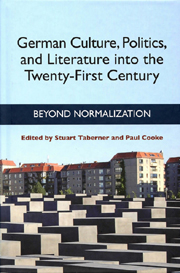Book contents
- Frontmatter
- Contents
- Acknowledgments
- Introduction
- 1 “Normalization”: Has Helmut Kohl's Vision Been Realized?
- 2 Coping with Disparity: Continuity and Discontinuity in Economic Policy since Unification
- 3 Understanding Germany: The Limits of “Normalization” and the Prevalence of Strategic Culture
- 4 “Normalization” through Europeanization: The Role of the Holocaust
- 5 “Representing Normality”: Architecture in Berlin
- 6 “Normalizing” the Past: East German Culture and Ostalgie
- 7 National Memory's Schlüsselkinder: Migration, Pedagogy, and German Remembrance Culture
- 8 The Return of “Undead” History: The West German Terrorist as Vampire and the Problem of “Normalizing” the Past in Margarethe von Trotta's Die bleierne Zeit (1981) and Christian Petzold's Die innere Sicherheit (2001)
- 9 “Normalizing” the “Old” Federal Republic? The FRG between 1949 and 1989 in Recent German Fiction
- 10 Reconciliation between the Generations: The Image of the Ordinary German Soldier in Dieter Wellershoff's Der Ernstfall and Ulla Hahn's Unscharfe Bilder
- 11 “(un)sägliche Vergleiche”: What Germans Remembered (and Forgot) in Former Yugoslavia in the 1990s
- 12 “Normal” as “Apolitical”: Uwe Timm's Rot and Thomas Brussig's Leben bis Männer
- 13 “Narrative Normalization” and Günter Grass's Im Krebsgang
- 14 From “Normalization” to Globalization. German Fiction into the New Millennium: Christian Kracht, Ingo Schulze, and Feridun Zaimoğlu
- 15 Abnormal Consensus? The New Internationalism of German Cinema
- Notes on the Contributors
- Index
12 - “Normal” as “Apolitical”: Uwe Timm's Rot and Thomas Brussig's Leben bis Männer
Published online by Cambridge University Press: 05 February 2013
- Frontmatter
- Contents
- Acknowledgments
- Introduction
- 1 “Normalization”: Has Helmut Kohl's Vision Been Realized?
- 2 Coping with Disparity: Continuity and Discontinuity in Economic Policy since Unification
- 3 Understanding Germany: The Limits of “Normalization” and the Prevalence of Strategic Culture
- 4 “Normalization” through Europeanization: The Role of the Holocaust
- 5 “Representing Normality”: Architecture in Berlin
- 6 “Normalizing” the Past: East German Culture and Ostalgie
- 7 National Memory's Schlüsselkinder: Migration, Pedagogy, and German Remembrance Culture
- 8 The Return of “Undead” History: The West German Terrorist as Vampire and the Problem of “Normalizing” the Past in Margarethe von Trotta's Die bleierne Zeit (1981) and Christian Petzold's Die innere Sicherheit (2001)
- 9 “Normalizing” the “Old” Federal Republic? The FRG between 1949 and 1989 in Recent German Fiction
- 10 Reconciliation between the Generations: The Image of the Ordinary German Soldier in Dieter Wellershoff's Der Ernstfall and Ulla Hahn's Unscharfe Bilder
- 11 “(un)sägliche Vergleiche”: What Germans Remembered (and Forgot) in Former Yugoslavia in the 1990s
- 12 “Normal” as “Apolitical”: Uwe Timm's Rot and Thomas Brussig's Leben bis Männer
- 13 “Narrative Normalization” and Günter Grass's Im Krebsgang
- 14 From “Normalization” to Globalization. German Fiction into the New Millennium: Christian Kracht, Ingo Schulze, and Feridun Zaimoğlu
- 15 Abnormal Consensus? The New Internationalism of German Cinema
- Notes on the Contributors
- Index
Summary
Normalization came to the German literary scene with the alacrity and clarity of a proclamation. In June of 1990, with the almost simultaneous publication of articles by Frank Schirrmacher in the Frankfurter Allgemeine Zeitung, Hajo Steinert in the Zurich Weltwoche, and Ulrich Greiner in Die Zeit (followed somewhat later by Hellmuth Karasek's article in Der Spiegel) the great Literaturstreit, or what was more popularly known as the Christa Wolf debate, broke onto the scene. In retrospect, one of the chief instigators of the controversy would claim that it was not really about Christa Wolf, over whom so much vitriol had been poured, but rather about a flawed approach to Vergangenheitsbewältigung itself. German intellectuals failed to judge aesthetically in considering works of East German literature, Greiner argued, because they were locked into a spurious binary response to Nazism. Specifically, the West German Left, because of its adherence to the Marxist view of fascism “as nothing but a murderous result of capitalism” (G, 66) made itself into apologists for socialism, including its literature. “One was either communist or anticommunist, fascist or antifascist,” he proposed, “the experience of National Socialism did not allow for a third way” (G, 67).
- Type
- Chapter
- Information
- German Culture, Politics, and Literature into the Twenty-First CenturyBeyond Normalization, pp. 181 - 194Publisher: Boydell & BrewerPrint publication year: 2006

